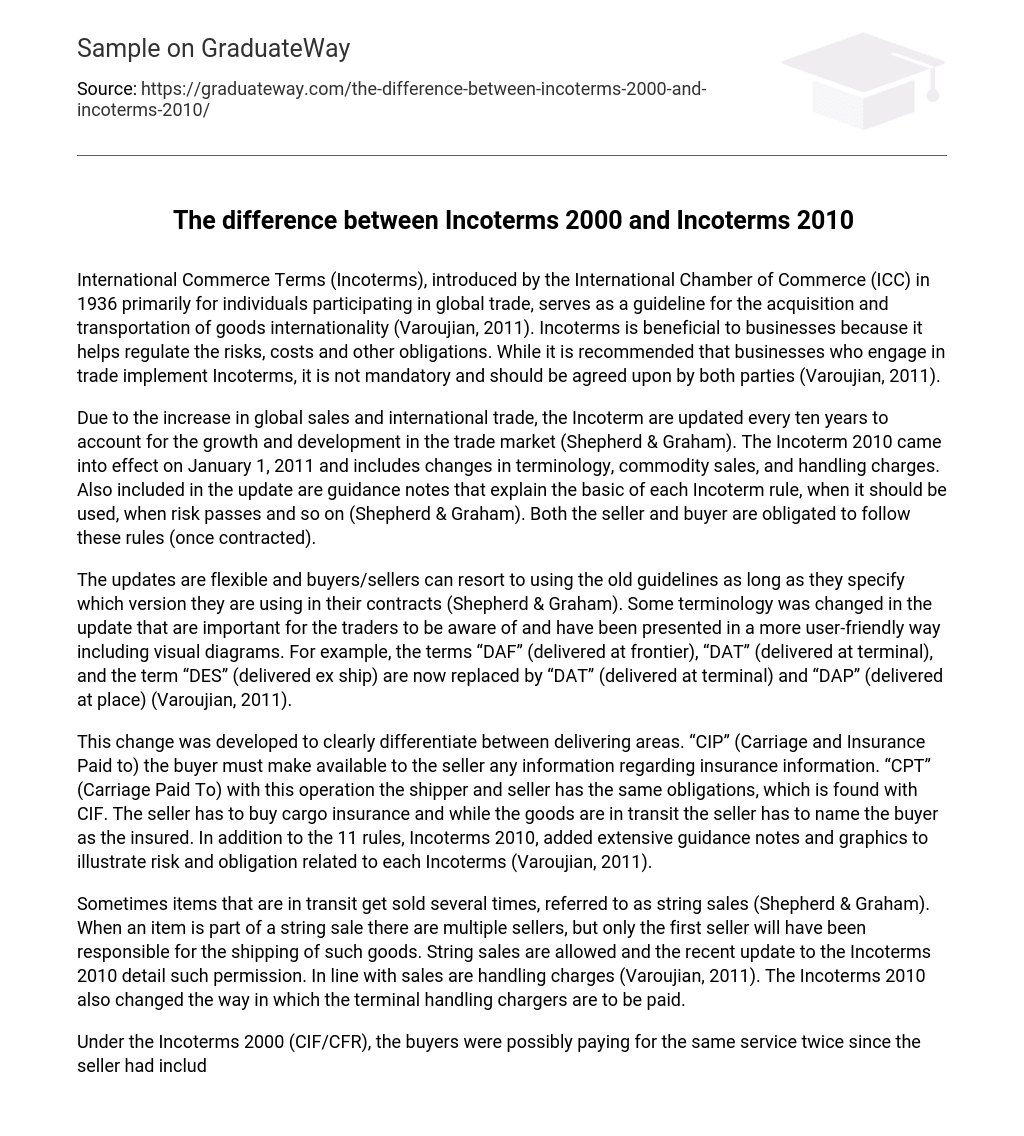International Commerce Terms (Incoterms), introduced by the International Chamber of Commerce (ICC) in 1936 primarily for individuals participating in global trade, serves as a guideline for the acquisition and transportation of goods internationality (Varoujian, 2011). Incoterms is beneficial to businesses because it helps regulate the risks, costs and other obligations. While it is recommended that businesses who engage in trade implement Incoterms, it is not mandatory and should be agreed upon by both parties (Varoujian, 2011).
Due to the increase in global sales and international trade, the Incoterm are updated every ten years to account for the growth and development in the trade market (Shepherd & Graham). The Incoterm 2010 came into effect on January 1, 2011 and includes changes in terminology, commodity sales, and handling charges. Also included in the update are guidance notes that explain the basic of each Incoterm rule, when it should be used, when risk passes and so on (Shepherd & Graham). Both the seller and buyer are obligated to follow these rules (once contracted).
The updates are flexible and buyers/sellers can resort to using the old guidelines as long as they specify which version they are using in their contracts (Shepherd & Graham). Some terminology was changed in the update that are important for the traders to be aware of and have been presented in a more user-friendly way including visual diagrams. For example, the terms “DAF” (delivered at frontier), “DAT” (delivered at terminal), and the term “DES” (delivered ex ship) are now replaced by “DAT” (delivered at terminal) and “DAP” (delivered at place) (Varoujian, 2011).
This change was developed to clearly differentiate between delivering areas. “CIP” (Carriage and Insurance Paid to) the buyer must make available to the seller any information regarding insurance information. “CPT” (Carriage Paid To) with this operation the shipper and seller has the same obligations, which is found with CIF. The seller has to buy cargo insurance and while the goods are in transit the seller has to name the buyer as the insured. In addition to the 11 rules, Incoterms 2010, added extensive guidance notes and graphics to illustrate risk and obligation related to each Incoterms (Varoujian, 2011).
Sometimes items that are in transit get sold several times, referred to as string sales (Shepherd & Graham). When an item is part of a string sale there are multiple sellers, but only the first seller will have been responsible for the shipping of such goods. String sales are allowed and the recent update to the Incoterms 2010 detail such permission. In line with sales are handling charges (Varoujian, 2011). The Incoterms 2010 also changed the way in which the terminal handling chargers are to be paid.
Under the Incoterms 2000 (CIF/CFR), the buyers were possibly paying for the same service twice since the seller had included freight costs as part of the sale price and buyers were being obligated to pay those additional costs during pick-up (Shepherd & Graham). There were times when the carrier or terminal operator expected the buyer to pay for handling and moving the goods. Incoterms 2010 made it clear which party is liable when delivery is on a Fee Carrier (FCA) basis and a Free On Board (FOB) basis. FCA” the seller is responsible for arranging transportation, and for all other related expenses where as “FOB” the seller is required to clear the goods for export but the buyer bears all cost from the moment the goods are en route to its destination (Varoujian, 2011). The changes made to Incoterms 2010 might at a first glance seem small and insignificant, but the Incoterms was made to avoid any misunderstanding between countries during trade. However, the revision is necessary because it serves as a set of regulations and definitions of the most commonly used contractual terms in trade agreement.





